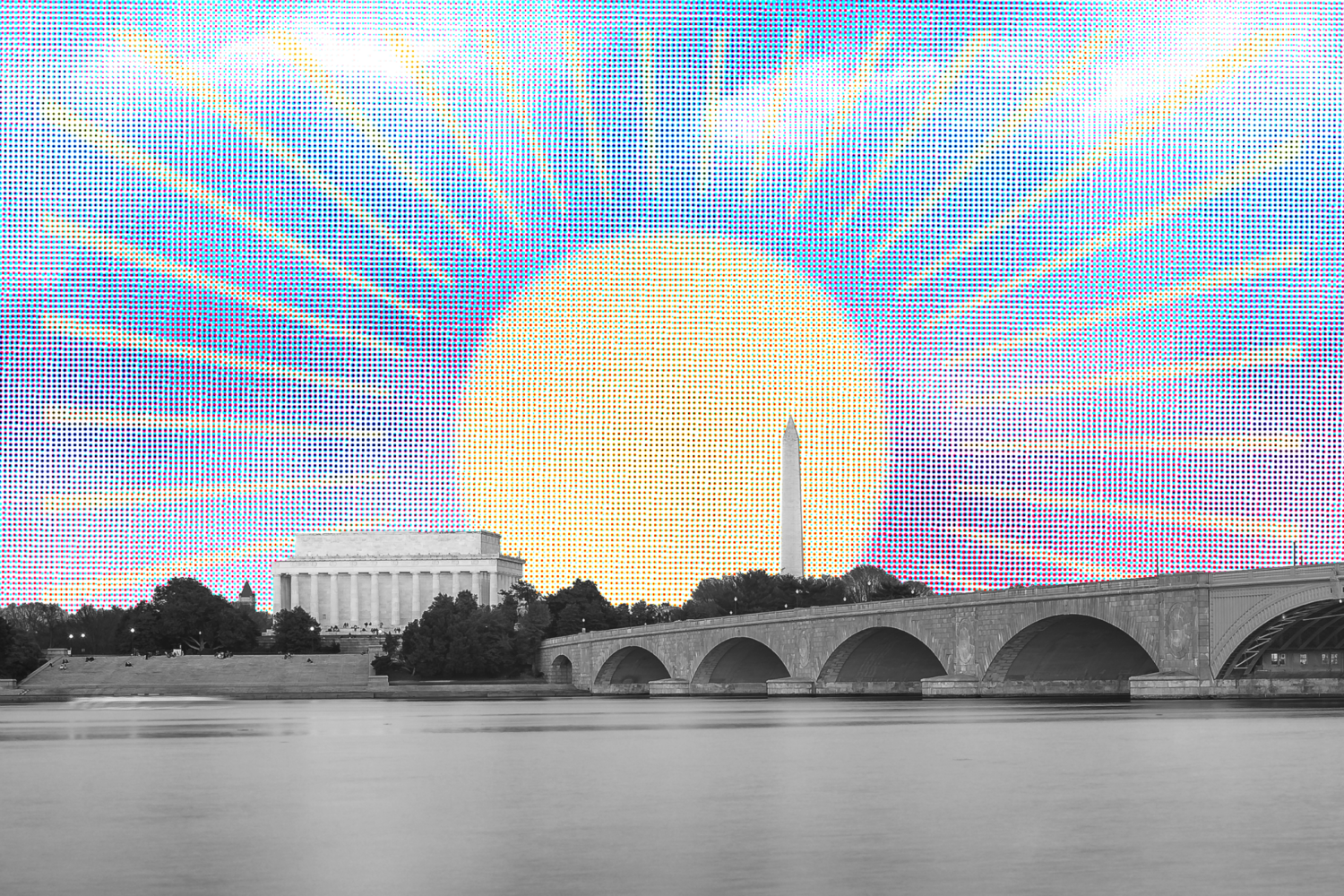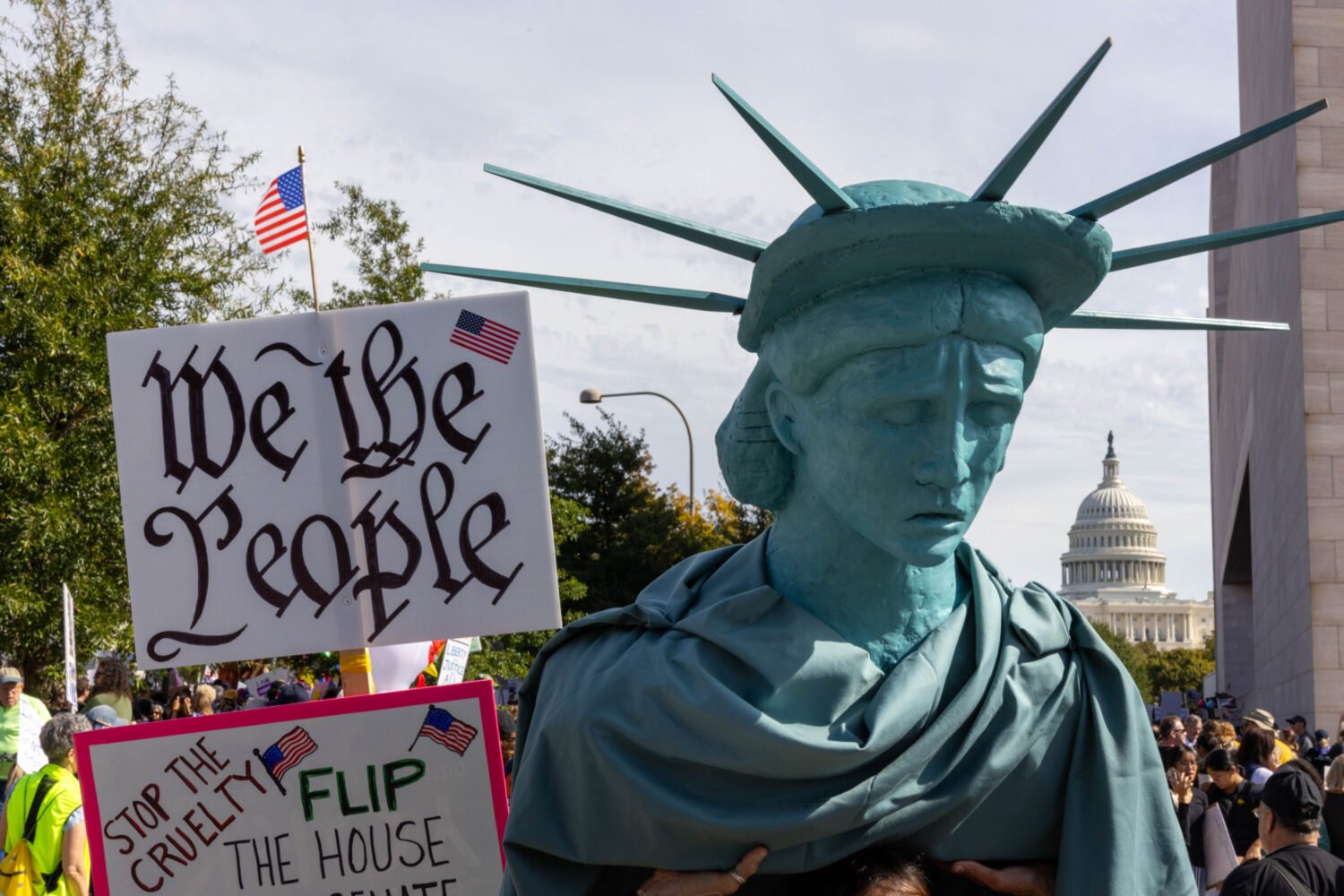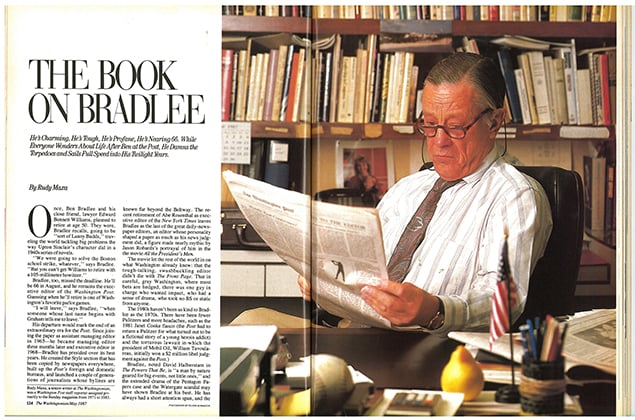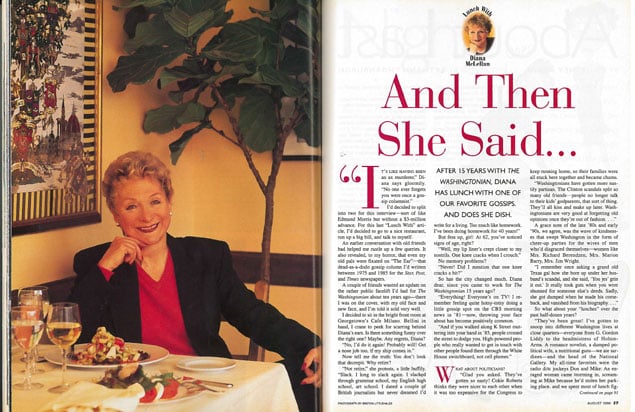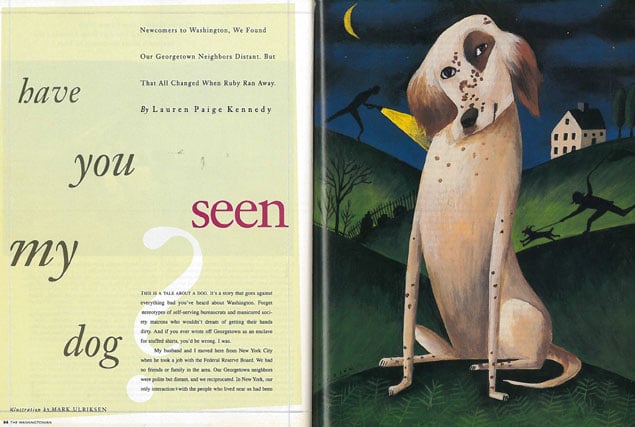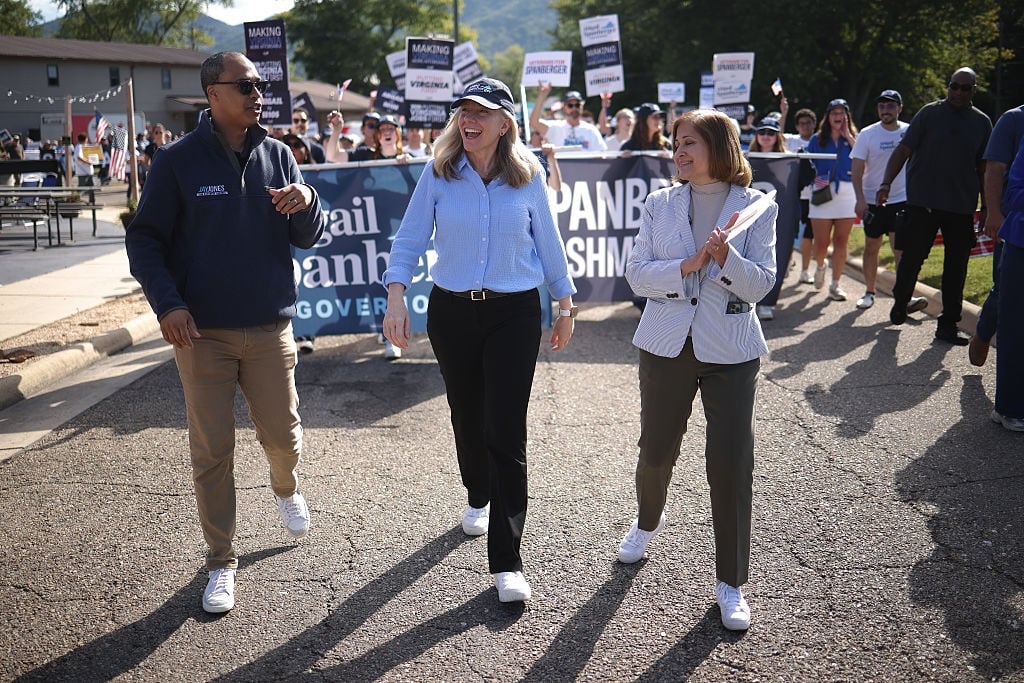John Glenn sounds like the rest of them. It is, he says, “a little premature, to say the least,” to talk about running for President in 1984. Just because he enjoyed a “big win” in his Ohio Senate race in 1980, just because he spoke in eighteen states last year, just because he went up to New Hampshire 27 months before the first presidential primary—just because of little things like that, people start jumping to conclusions. He sounds like the girl in the hotel room who wonders how anyone got that idea.
The funny thing is that John Glenn means it. He is ambitious enough to run for President. But he is still too ambivalent to make the commitment. “He can be convinced at one level,” says Stephen Avakian, who managed Glenn’s last Senate campaign, ”but on another stratum, he keeps his options open.” Glenn has told people privately that he doesn’t see any reason he shouldn’t do as well as any number of rinky-dinks who have achieved the White House or aspired to it. But he is not yet ready to put himself out there beyond discretion. He is a very cautious politician.
So all John Glenn has done so far is make those trips and give those speeches. Unlike Fritz Mondale and Ted Kennedy, he has no political-action committee. He is financing his travels with the surplus from his 1980 Senate campaign. He has no national political apparatus, although occasionally he talks to professionals who have· worked for him in the past, such as pollster Peter Hart, or who have become allies back home, such as Paul Tipps, the Ohio Democratic chairman. When Glenn is pressured, he digs in his heels. “I’ve never let people push me around in politics,” he says.
Like every other politician, he can rationalize his strategy—or lack of strategy. In common with many Democrats, Glenn is persuaded that there is a substantial need in his party for, first, a new generation of candidates and, more important, a new set of ideas. If the whole thing is going to rest on issues in 1984, he asks rhetorically, what’s the rush about putting together the machinery?
It is easy for Glenn to take this approach. He is an extraordinary celebrity. When he travels, even politicians line up for his autograph, and 90 percent of the voters already know who he is, about as many as know Ted Kennedy. He is free from the necessity of peddling himself door to door, as Reubin Askew or Gary Hart or even Jay Rockefeller would have to do.
But those who know the political Glenn suspect that there are other elements in his reluctance to make a presidential commitment. For one thing, he is never totally comfortable with either politics or politicians, despite the success he has enjoyed. In the Senate he has colleagues and allies on issues—Sam Nunn on a military question, for example, and Charles Percy on nuclear nonproliferation—but they are not his intimates. If there is one, other than his wife Annie, it is another retired Marine, Lieutenant General Thomas H. Miller Jr., who often flies with Glenn in the latter’s twin-engine Beechcraft Baron. Back at home, there are others who are counted as friends and political associates. Two prominent Cleveland men are most often mentioned: Milton Wolf, a developer and former ambassador to Austria, and Bernard (Buddy) Rand, a lawyer and fundraiser. They are not day-to-day politicians, and that makes a difference with Glenn.
It seems largely a matter of personality and temperament. “He tends to be rigid,” says a professional who has known him for a long time. “He sees things in black and white, and he isn’t always comfortable with the way politicians do things. If he decides something is ‘right,’ then he’ll do it. If not, he won’t.” That is not the way most practiced politicians think. Says another professional: “John Glenn is an instinctive politician who probably relies on his own resources too much.”
Because of this mix of attitudes, Glenn has a reputation of being something of a loner. This reputation extends beyond the hackneyed image of him as the ultimate 60-year-old Boy Scout from New Concord, Ohio. He is seen as remote, standing apart from the political world.
There have been some recent indications, however, that he may be bending a little. They are not big things, but Glenn is such a studied politician that those who know him tend to take small concessions more seriously in him than they might in someone else. One old associate speaks with wonder, for example, of Glenn’s willingness to approve the appointment as a United States marshal of a Democratic county chairman who once denied Glenn’s daughter Lyn a chance to speak at a meeting. “There’s a streak of pragmatism I’ve never seen before,” this source says.
• • •
Glenn flew to Washington state last fall to make a series of appearances for the Democratic National Committee and the state’s Democratic party. The first night, speaking at a fund-raiser for state legislators in Olympia, he was the usual reasonable John Glenn, cautioning that Ronald Reagan and his program should be given a chance before being judged. That night Karen Marchioro, the state Democratic chairman, complained to Bill White, Glenn’s principal aide, that some red meat was required. In the Pacific Northwest, she argued, the economic situation was so distressed that a negative verdict was already in on Reaganomics.
The following day, talking to cocktail party and rally audiences, Glenn was—in Marchioro’s phrase—”a lot more feisty” and the local Democrats a lot more enthusiastic. And a week or so later, speaking in New Hampshire for Governor Hugh Gallen, Glenn was downright partisan—without any prompting. He derided Reaganomics as “economic laetrile” and David Stockman as one who has ”broken faith with the country as well as Congress, and his confession [in the Atlantic Monthly] reveals him to be one of those who know the cost of everything and the value of very little …. One million Americans have lost their jobs, and I see no earthly reason why David Stockman should keep his.”
His speech drew burst after burst of applause. At one point he declared: “If the administration would spend as much time making foreign policy as they have trying to cut Social Security, maybe we’d be frightening our enemies instead of our senior citizens.” And: “Any administration foolish enough to call ketchup a vegetable cannot be expected to cut the mustard.”
To anyone familiar with Democratic politics, all this sounds unremarkable enough. But the point is that for John Glenn it represented something of a departure, and he recognized it as such. Out in Seattle, he said later, with a small smile: “I guess they expected a Democratic-hurrah speech at every stop.” And he delivered it, although he was not totally comfortable with the idea. “I don’t like the personal attack,” he said.
On the contrary, Glenn’s standard political rhetoric, as opposed to his discussions of issues, has been prosaic to a fault. He talks in terms of ”the promise of America” and ”the kind of leadership this state deserves” and “the goals that all of us share” and ”the urgency of this task” and “formidable problems” and “the greatest nation on the face of the earth” and ”a shining beacon of freedom and opportunity.” What has passed for fiery rhetoric from Glenn is, for example, this passage from a speech to a Jefferson-Jackson Day audience in Springfield, Missouri, last April: “The administration says that we should give huge tax breaks to wealthy individuals in the hope that they’ll invest … productively. I say that’s a lot like diving into a swimming pool in the hope that water will be there by the time you hit bottom. I say let’s not gamble with American jobs and America’s future. Instead, let us provide a more direct approach to the investment problem and ensure that our children will enjoy happy, prosperous tomorrows.”
Everyone understands that the level of a candidate’s oratory has little or nothing to do with a candidate’s ability. Yet in Glenn’s case, current rhetoric is worth noting for one reason—his infamous keynote speech to the 1976 Democratic National Convention in New York City. It is one of those things that 99.9 percent of the American people probably have forgotten, but it is written into legend among the remaining fraction—the activists of the Democratic party. To this day, their view of Glenn is colored by it. To this day, they tend to use that speech as a measuring stick in telling you how much better he has become. “Of course,” says Karen Marchioro, after praising Glenn’s performance in Seattle, “I was at the convention of 1976.” Enough said.
The fact is that the speech, over which Glenn labored exhaustively, with help from writer Loudon Wainwright, was not much different from the speeches keynote speakers have given at other conventions of both parties. But Glenn suffered because he was only one of two keynoters, and the theatrical style of the other, Barbara Jordan, provided such vivid contrast.
Beyond that, there was the context. Glenn ostensibly was one of the five or six “finalists” on Jimmy Carter’s list of potential vice-presidential nominees. So his speech was viewed as an audition by the few in the audience who bothered to listen, and it clearly did not meet their expectations. Giving a bad speech is not a crime, of course; if it were, most members of the Senate would be in irons today. But giving a bad speech on an occasion that has been imbued with such significance is at least an unforgettable offense.
• • •
Today Glenn laughs it off, although somewhat unconvincingly, as ”water over the dam,” but at the time he was less philosophical. ”He was shattered,” says a longtime associate. “He used language I’ve never heard him use before or since.”
A reputation for being dull is not the only one Glenn has been forced to overcome. He came to the Senate in 1974 in the face of pervasive skepticism among liberal Democrats who then held sway in the party and who had been devoted to Howard Metzenbaum, defeated by Glenn in a primary. Glenn, they sniffed, might be an astronaut and national hero but, having spent 23 years in the Marine Corps, he must be too light for the job.
It was a bum rap—a product of the kind of liberal elitist thinking that flourished in those days, when liberals could pretend to be elite. Glenn has demonstrated as much in the Senate over the past seven years. Although he is not one of the boys, he is a senator to whom other senators listen, because he does his homework now just as obviously as he did when he was in the Marine Corps and the space program. Before the Soviet invasion of Afghanistan made the SALT II issue academic, it seemed likely that ratification of the treaty might turn most on Glenn’s assessment of whether it could be adequately verified. Similarly, he was a leading figure last year in seeking a safe compromise on the sale of the AWACS jets to Saudi Arabia. He has figured significantly in blocking President Carter’s plan to withdraw troops from South Korea, in promoting more manned bombers, and, foremost, in mounting legislation against the spread of nuclear weapons.
He has not always been successful, of course. He once tried to write a “sunset” provision into tax law that would kill off loopholes after a fixed period, but he learned a hard lesson from Russell Long about the realities of the Senate Finance Committee. He once horrified and antagonized colleagues by proposing that a special board be created just to hear complaints of job discrimination against senators.
But there is little argument that his record and reputation in the Senate are now substantial, and few would argue with his assessment that he is “well past the point” at which his ability would be suspect. Some of those who know him best, however, suggest that Glenn is still irked by such early criticism and that a need for justification may be one of the factors pushing him toward a presidential campaign.
• • •
Aside from his remarkable political success in Ohio, it is his record on issues that has done the most to stimulate curiosity about Glenn in the political community. On the face of it, he seems exceptionally well positioned for the times—a devoted advocate of a strong national defense when the country will abide nothing less, but still liberal enough on such social issues as abortion and the equal-rights amendment to be tolerable to most, if not all, of the Democratic left.
Glenn’s credentials are not perfect by any means. Roughly three years before the fact, it is hard to imagine any issue other than the state of the economy dominating an American election. And Glenn clearly lacks a sharp identity on economic questions. As a practical matter, however, candidates are rarely nominated or elected on the strength of particular proposals or policy positions. Instead, they succeed or fail on the basis of the complete picture that emerges from their priorities, their personality, and their political skill.
So the central question about John Glenn is whether he can meet the political criteria to be a serious possibility for the Democratic presidential nomination. Can he demonstrate the broad appeal needed to capture the White House? Can he stand up under the pressures of being out front in a national campaign? Can he put a campaign together?
On the surface, the political evidence is impressive. Glenn lost his first primary campaign, against Howard Metzenbaum in 1970, in some measure because he was both inexperienced and overconfident. But he defeated Metzenbaum, then serving as an appointed senator, four years later and went on to win the general election with 65 percent of the vote. Last year he was reelected with 69 percent and a plurality of 1.6 million votes at a time when the presidential vote in Ohio was almost identical to the national figures—Reagan 52 percent, Carter 41, John Anderson 6. He drew one million votes more than Carter there.
The response to Glenn also has been generally favorable, if less than wildly enthusiastic, on the forays he has made since that election. In New Hampshire he clearly impressed Hugh Gallen, a politician with an excellent sense of the political middle. And, in Washington state, Karen Marchioro ended up singing his praises despite her initial misgivings. “He’s really nice,” she says. “When he talks to you, he isn’t always looking at the next name tag. “
What may be just as important, in the national arena, is that there is a hard edge under Glenn’s benign facade. This first became apparent in that 1974 challenge to Metzenbaum. The Democratic governor at the time, John Gilligan, was seeking reelection and hoping it would lift him to a place on the party’s national ticket in 1976. He had appointed Metzenbaum to the Senate. vacancy, and the last thing he needed was a primary fight. What he did need was a running mate who would make it possible for him to leave the state if his big plans came to fruition.
So Gilligan, who never has been shy about having his own way, put the heaviest sort of pressure on Glenn to run for lieutenant governor, even to the point of luring him to a stacked meeting of labor leaders prepared to promise their undying enmity if Glenn did not cave in. It was, Glenn recalls, a ”sort of bare-knuckles business.” But Glenn refused to budge. On the contrary, he went before a meeting of the state party executive committee and, with the press listening, complained: ”Suddenly, inexplicably, I am alone and marked for political extinction.”
This move left Gilligan naked—and served notice that John Glenn had learned a few tricks since losing the earlier primary in 1970. Looking back on it now, Glenn sounds characteristically prissy. ”This had really gotten beyond the realm of what I thought was proper in politics,” he says. To others, it is remembered as basic political hardball.
Glenn also has a long political memory. His relationship with Metzenbaum is strained to this day. To some extent, this is simply a product of the cultural differences between a Boy Scout from New Concord and a big-city boy from Cleveland. But those who know Glenn say it is also a reflection of his memories of their two campaigns against each other.
Similarly, it is no secret that Glenn, although once close to Robert Kennedy, holds Ted Kennedy in less than high regard. Again, some of this may be ascribed to the differences in backgrounds and life-styles. But another factor is understood to be Glenn’s belief that Ted Kennedy was responsible in 197 4 for Ethel Kennedy’s refusal to campaign for Glenn in that primary.
Glenn also was angered by a report after the 1976 election—in a book by Richard Reeves—that when he was being considered for Vice President, Rosalynn Carter had questioned whether his wife’s speech impediment might be a political handicap. Indeed, that obviously still rankles. “It is something that makes you grit your teeth,” he said recently. Glenn is enormously proud of the success Annie Glenn has enjoyed in overcoming her stutter through a vigorous program of therapy.
• • •
Little or any of his hard edge shows when John Glenn campaigns. Instead, he comes over to his audiences much the way he did when he burst on the nation’s consciousness twenty years ago—as that nice guy everyone could applaud. What is unclear is how much this warmth of reaction means to Glenn. Paul Tipps is persuaded that Glenn is moving ever closer to running. “I don’t think he’s made his mind up,” he says, “but from election night [of 1980] to this point, his interest has consistently and constantly increased.”
Glenn himself says he probably won’t make a decision until sometime next fail, after reassessing Ronald Reagan and his economic program. “That’s when you get a reading on whether it’s working or whether it’s a disaster,” he says. “At that time, it’s his government and his foreign policy and his defense budget. A lot of things will sort themselves out late next year.”
That sounds like a classic political stall, of course. But those who know Glenn’s political thinking caution against drawing too many inferences. He is not, they point out, an ordinary politician who can be counted upon to seek the next-highest level if only to hear how the applause sounds then. He has had his ride up lower Broadway while millions cheered and garlanded his motorcade in ticker tape. He has addressed a joint session of Congress while the whole nation watched. He is already in the history books.
There is a relevant story in Gay Talese’ s classic Esquire profile of Joe DiMaggio in 1966. Marilyn Monroe, just back from entertaining the troops, tells DiMaggio of the frenzied reception she was given. “Joe,” she says, “you never heard such cheering.” And DiMaggio replies: “Yes, I have. ” Glenn has heard the cheering, too.
Says John Glenn: “Just to have it in your folder that you ran for President sometime—I don’t find that necessary. ”
This article appears in the February 1982 issue of The Washingtonian.



